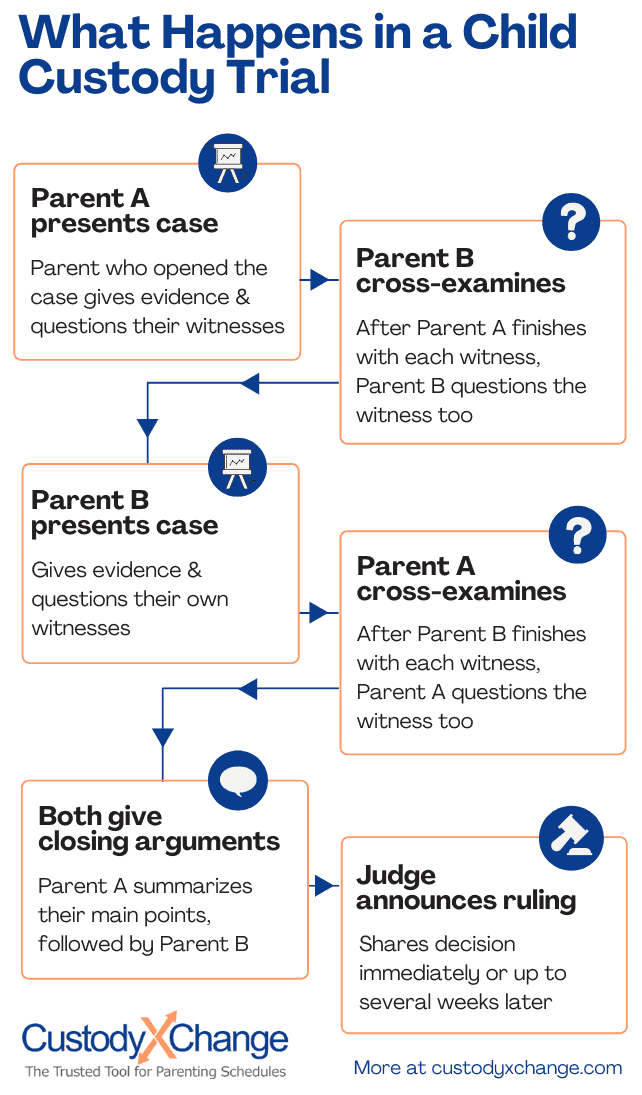Arizona Child Custody Trial: How to Prepare
When parents can't agree on a settlement, a judge decides the case in trial.
At a trial, parents present evidence and argue their case so the judge can determine the best parenting plan, parenting time and child support arrangements for the children.
A trial can take a year or more to prepare for, while the trial itself might take only a few hours or days.
Settling instead of going to trial
Arizona courts greatly prefer that parents reach an agreement, and experts recommend it.
To encourage settlement, your court will likely require you to attend mediation during the litigation process (unless your case involves domestic violence). You might also consider collaborative law or parenting coordination to help you reach an agreement.
What happens at a trial
During a trial, parents argue their case through opening and closing statements and evidence. Parents can question witnesses (both their own and the other parent's) and challenge each other's evidence. If you have a lawyer, they'll do all this for you.

The judge may interview children in their office (chambers) with only a court reporter and, possibly, parents' lawyers present. If your case has a best interests attorney, they'll participate on the children's behalf.
After the arguments, the judge may announce decisions immediately or take a break to further consider the evidence. Judges can adjourn for up to 60 days before issuing final orders.
Getting ready for trial
If you have a lawyer, they'll help you get ready for trial, including by preparing evidence and any testimony you may need to provide. Make sure you give them everything they request, and always be honest with them so they can best represent you.
If you're representing yourself, start by familiarizing yourself with your court's rules and how a judge decides what's in the children's best interests.
Preparing evidence
The evidence you need depends on your case, but it should show how you and your proposed parenting plan support your children's best interests. You may need to prove things from your court paperwork, disprove the other parent's claims or challenge a report from an evaluation, parenting conference or court-appointed advisor.
Common evidence includes photos, emails, text messages, social media posts, family calendars, official records and witness testimony.
Witnesses testify in person or submit written sworn testimony, depending on their availability and the court's procedures.
Lay witnesses (non-experts) testify to what they have personally observed. These witnesses often include parents themselves, relatives, child care providers, children's and parents' therapists and doctors, etc.
If they cannot appear in court, some judges accept character reference letters from witnesses.
Parents can also hire expert witnesses, such as child development specialists, to offer professional opinions.
Discovery
Discovery is the multi-part process of sharing information with the court and the other parent.
The first part of discovery is disclosure. Both parents must disclose all their financial details and information relevant to the children's care. Both must file a resolution statement, in which they explain how they want each disputed issue resolved. Parents also provide each other with a list of the witnesses they plan to call.
Next, parents send and complete interrogatories — questions that must be answered in writing and notarized. Both parents must complete the standard Uniform Family Law Interrogatories; they can also ask each other additional questions.
Some parents also send admissions of facts. These are statements (25 maximum) that the other parent must respond to in writing. For example, a parent might state, "On May 15, 2025, you withdrew $4,000 from our joint savings account." The receiving parent must admit, deny or object to each statement. If they don't respond within 40 days, the court assumes they admit to everything.
In the request for production stage, parents share all of the exhibits (physical evidence) they're planning to use in the trial.
In the last stage of discovery, parents or their lawyers question each other's witnesses under oath for the court record. These interviews are called depositions.
Pretrial statement
At least 20 days before trial, divorcing parents must submit a statement listing their case details, including evidence they plan to present, witnesses they plan to call and objections they have. If parents have lawyers, they must file a joint pretrial statement. If parents are representing themselves or if the case involves domestic violence, parents file separate statements.
Sometimes, the judge holds a conference to review and discuss the statement. To encourage parents to settle, the judge tells them how things are likely to play out in court.
Trial tips
- Ask the court clerk about your court's procedures.
- Dress professionally.
- Arrive early to find parking, go through security and locate the courtroom.
- Only bring your children if they're being interviewed that day.
- Friends and family can attend, but don't bring new romantic partners.
- Refer to the judge as "Your Honor."
- Show respect to everyone, and never interrupt.
- Ask for clarification if you don't understand something.
- When speaking, take your time, but don't ramble or go off topic.
- Answer questions directly, and only provide explanations when prompted.
- Don't lie or provide misleading information.
Using technology for your trial
Trials require serious organization.
You may need to propose parenting time schedules, suggest a parenting plan, show messages from the other parent and more.
The Custody X Change online app lets you create and manage all of these elements in one place. With customizable visitation calendars, a parenting plan template, printable parent-to-parent messaging and beyond, it helps you prepare for every step of your case.

You can customize this to fit your situation with Custody X Change.
Take advantage of custody technology to get what's best for your children.
